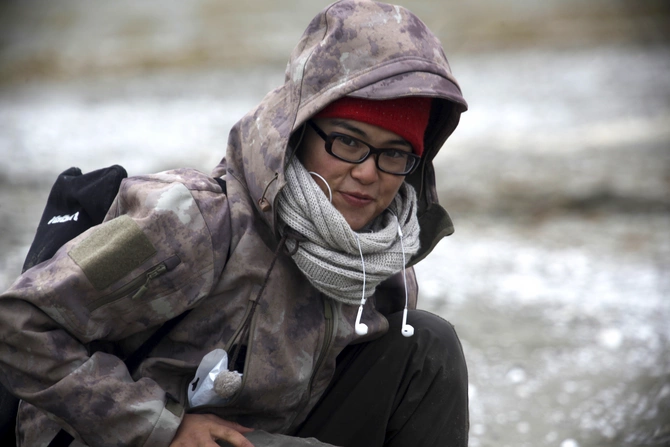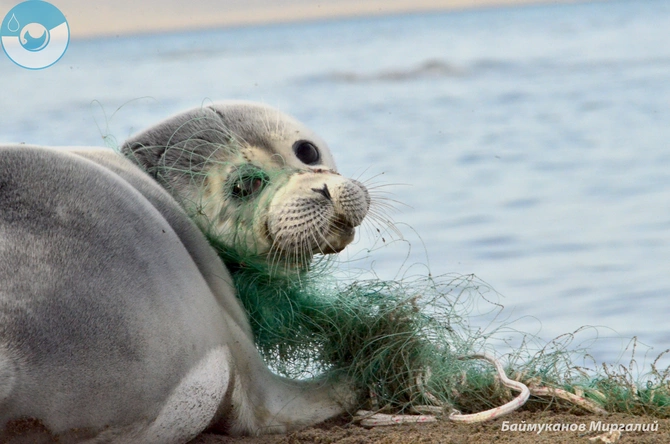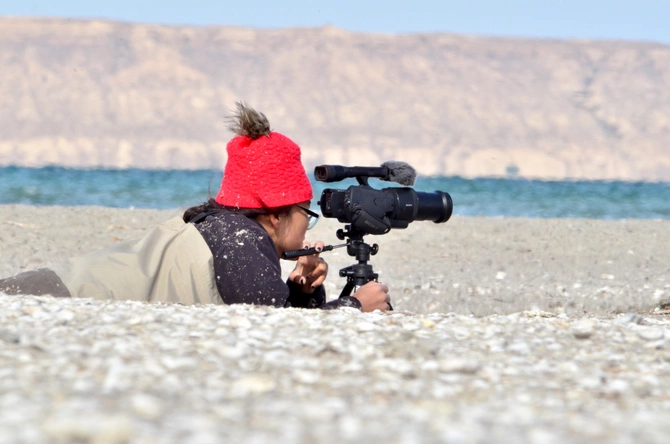
Growing up, Assel Baimukanova saw her father, a marine biologist Mirgaliy Baimukanov, monitoring Markakol lenoks, a species of fish that can only be found in the Markakol Lake in Kazakhstan. She wanted to follow in his footsteps. He, however, wasn’t so keen on it. “Why do you need to be digging in the cold all your life?” Now she is 32, and despite getting her degree in philology as her father wanted, she spent over ten years in the marine biology field working alongside her father and her hydrobiologist sister.
Image: Assel Baimukanova
Assel Baimukanova has just returned from her seasonal trip to the Caspian Sea, where she was monitoring the Caspian seals. “The only mammals in the Caspian Sea,” she points out, adding that they are also the smallest seals in the world. She is already planning her next work trip. “The expedition lasts from one to two months, taking into account preparation and fieldwork,” Baimukanova explains. Due to the Caspian Sea shallowing and new islands appearing, the exact whereabouts of the Caspian seals are changing, but thanks to satellite images, they are able to predict where the mammals can be found. Once in the field, their team spends around 14-20 days in two groups. The first group monitors the Caspian seals, while the second stays in the camp. “It is physically and mentally difficult to live there,” she says.
There was a turning point in her career when, in 2017, together with her team, she was observing dead Caspian seals—in what she calls “the year of mass mortality” with 250 documented deaths. Trying to find their cause of death, they were living next to dead seals for seven days. She admits that she was ready to quit then and there when her father told her, “If you want to protect animals, you must understand that there are two sides of the same coin—death and life. Now we are fighting for life.” That’s when her love and empathy for these unique creatures turned into something more than just an emotional attachment. “During these seven days, I managed to view it as my work and scientific activity. This monitoring had to be carried out efficiently,” she explains, adding that the only way to get her work done was to do so rationally without a “romantic component” and “feelings of compassion.” “After that, I decided not to leave.” Instead, Baimukanova went on to get her Master’s in Ecology and continue her scientific endeavours.

This division between science and her personal feelings toward Caspian seals is significant when compared to the beginning of her path as a marine biologist. After finishing her Bachelor’s and while considering going into the corporate world, Baimukanova agreed to help her father document Markakol lenoks on video for a year until he found a professional to do it. “The first expedition did not go very well. I was not prepared for the field life—there were mosquitoes, and it was cold. I decided that this was not my thing, but when I arrived, I realized that this was a unique experience,” she reminisces. “I felt a great connection with nature; it was important for me to feel unity, and I started going every year.” Yet every time she went she would cry saying that this was the last time.
A few years later, when her father was invited to participate in the icebreaking in the Caspian Sea, she saw the Caspian seals for the first time in her life. This meeting proved to be life-changing. Witnessing the problems that they face, Baimukanova started wondering, “How does an animal feel when their home is destroyed, and their original habitats are affected? What can we do to reduce the anthropogenic load?” She soon realized that science was the answer to solving these problems. “We do not live in a fairy-tale world, we understand that there is no escape from oil production, the only thing we can do is reduce the burden on the animals through research and activities.”
In 2015, she went with a group of Kazakh scientists as a camerawoman to document the Caspian seals. Crawling up close to them, she witnessed three Caspian seals, one of them suffocating in the fishing net, while two others stayed with him. “Seals stay with a sick or dying animal,” Baimukanova explains. Seeing the consequences of human actions and the suffering of the animals is what started her scientific career. “I took up the topic of animal observation. It was incredible, I could get close to them without scaring them.”

Human cruelty towards animals has been highlighted in Kazakh public discourse when, a few years ago, two incidents of Kazakhstanis beating up seals that came too close to the shore of the Caspian Sea became major news, further pushing lawmakers to adopt new animal protection laws. “This incident drew attention to the existence of Caspian seals in our country.” Baimukanova explains that although she doesn’t justify the actions of people who attacked the seals, these incidents gave “some kind of impulse” that led to the interest of the population in the lives and preservation of Caspian seals in Kazakhstan, as well as the discussions of “creating a state natural reserve.” Besides, she is certain that the number of people in the country who love these mammals outweighs “such negative cases.”
Nowadays, she combines her work with PhD studies in Fisheries Science. When she is not in the field monitoring the Caspian seals, she is writing the analysis of their behaviour. Although being a scientist in Kazakhstan comes with its own difficulties—such as funding being constantly cut—Baimukanova says that government funding still helps a lot. “It covers important expenses for salaries, equipment, and expeditions. Thanks to the government support, we were able to raise young specialists. Our organization is different from others in that we employ mainly young specialists,” she explains.

Another difficulty lies in being a woman scientist. “Often women do not work in the field because male strength is needed,” Baimukanova says, adding that “this is not about sexism.” Yet, thanks to her camera work, she is able to participate in the fieldwork. The problem with women not being allowed to go to the field also means they are getting paid less than men, as fieldwork simply pays more. She admits that a lot of times, she faces questions regarding her safety while working with men in the field. “I am responsible for my safety. The people I work with are not animals, they control themselves. We are a friendly team and work well together despite the fact that I am a woman and they are men,” she explains. “This is a big problem in science. Some scientific institutes have the idea that women should not be sent to fieldwork.”
Baimukanova doesn’t let it stop her from doing the greater good. Their team is currently promoting an action plan for the conservation of the Caspian seals and getting it approved by the government. “We touch upon legislative initiatives, changes and additions to the environmental code, and the creation of regulatory legal acts,” she explains. According to Baimukanova, Kazakh scientists currently have more knowledge about Caspian seals than their neighbours bordering the Caspian Sea. “We have more research, more resources invested, and we are talking more about preserving and creating a natural reserve that will protect the main areas where Caspian seals live.” However, as Caspian seals do not belong to any country and exist outside of geopolitical borders, their preservation can only be achieved if all five Caspian countries start participating in the process of saving these rare and unique marine mammals.
See their latest video "


Share on social media